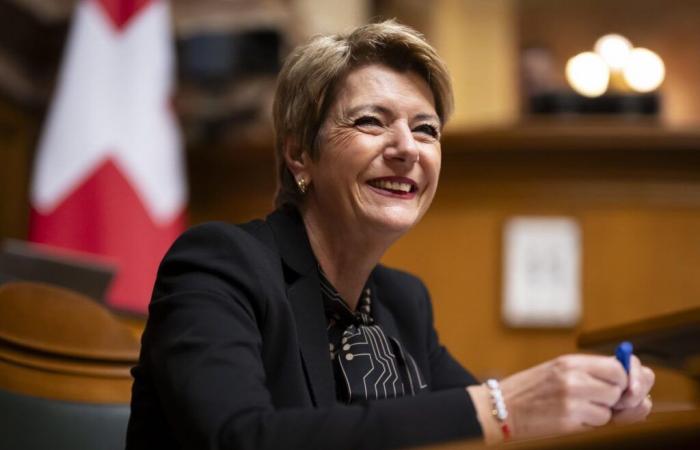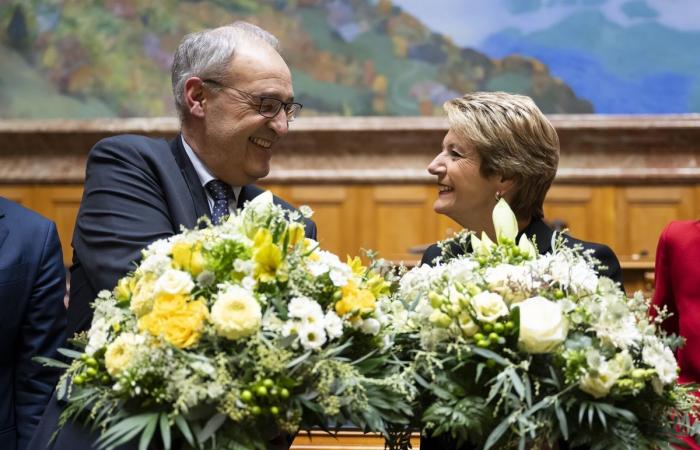Election in the Federal Parliament –
Karin Keller-Sutter will be Federal President next year
Parliament elected the liberal from St. Gallen with 168 of 203 valid votes. In her speech she advocates compromise and exchange.
Karin Keller-Sutter has been elected Federal President for 2025.
Foto: Anthony Anex (Keystone)
Subscribe now and benefit from the read-aloud function.
BotTalk
Finance Minister Karin Keller-Sutter will be Federal President next year. Parliament elected the liberal from St. Gallen on Wednesday with 168 of 203 valid votes. This is a below-average result.
Of the 232 ballots cast, 23 were inserted blank and 6 were invalid. 35 votes did not go to the 60-year-old finance minister, but to other people.
Presidencies in FDP hands
With the election of Keller-Sutter, the presidencies of the Federal Council and both chambers of parliament will be in liberal hands next year. Because not only the Finance Minister belongs to the FDP, but also National Council President Maja Riniker (AG) and Council of States President Andrea Caroni (AR).
Keller-Sutter put her task at the center of her inaugural speech after the election. The state government should be able to make decisions and act as a collegial authority, she said. As Federal President and chair of meetings, she is legally responsible for ensuring that the Federal Council takes up and completes its tasks in a timely, expedient and coordinated manner.
The Federal Council must be a reliable partner for parliament, a prudent leader for the administration and a trustworthy institution for the population. In her speech to parliament, she also called for compromises and exchange.
Disapproval or approval
Although election to the Federal Presidency is considered a formality, council members often use it to express their displeasure or approval to members of the government. On average over the past ten years, the federal presidents received 178 votes from parliament.
However, before Keller-Sutter, Viola Amherd (center), Alain Berset (SP) and Ignazio Cassis (FDP) also had results below the average. The best result in recent decades was achieved by SVP Federal Councilor Ueli Maurer in 2018 with 201 votes, the worst by Micheline Calmy-Rey (SP) in 2011 with 106 votes.
The Social Democrats Hans-Peter Tschudi (BS) and Willi Ritschard (SO) achieved the best result of all time: both were elected Federal President in 1970 and 1978 with 213 votes each.
With Keller-Sutter, the canton of St. Gallen has its federal president for the first time in exactly forty years. The last person from St. Gallen to hold this office was Kurt Furgler (center) in 1985, who was then in his third year as Federal President.
Tenth Federal President
Before Furgler, the St. Gallen Thomas Holenstein (Mitte, 1958), Karl Kobelt (FDP, 1952 and 1946), Arthur Hoffmann (FDP, 1914) and Wilhelm Matthias Naeff (FDP, 1853) held the office. The canton has so far provided a total of six Federal Council members.
Keller-Sutter is a female federal president for the tenth time – but the liberal is only the sixth woman to hold this office. Doris Leuthard (center), Simonetta Sommaruga (SP) and Micheline Calmy-Rey (SP) were Federal Presidents twice and Ruth Dreifuss (SP), Eveline Widmer-Schlumpf (BDP) and Viola Amherd (center) once each.
Guy Parmelin (SVP) was elected Vice President of the Federal Council for 2025, with 196 of 219 valid votes. This means that Parmelin is likely to become Federal President for the second time in 2026.
Karin-Keller Sutter and Guy Parmelin receive applause and flowers after their election.
Foto: Anthony Anex (Keystone)
Parmelin was already Federal President in 2021. The now 65-year-old was elected to the Federal Council in December 2015 and initially served as Defense Minister. In 2019 he moved to the head of the Department of Economics, Education and Research (WBF).
The FDP St. Gallen was pleased: December 11th was a historic day for the canton and the party. Karin Keller-Sutter is the first person from St. Gallen to hold “this dignified office,” according to a statement. The public election ceremony will take place in Wil next week.
23 votes went to other people. Parmelin was already Federal President in 2021. The now 65-year-old was elected to the Federal Council in December 2015 and initially served as Defense Minister. In 2019 he moved to the head of the Department of Economics, Education and Research (WBF).
The morning
The perfect start to the day with news and stories from Switzerland and the world.
More newsletters
Log in
red
Found an error? Report now.
17 comments







